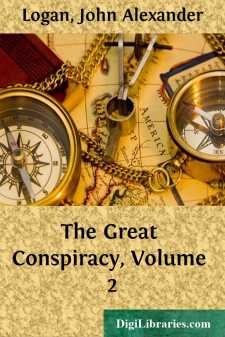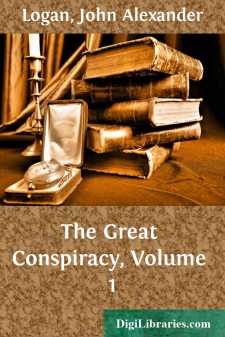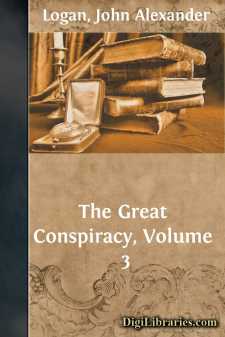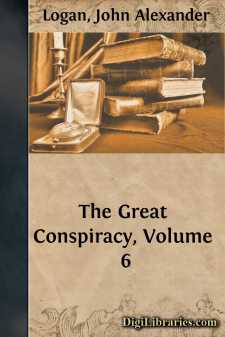Categories
- Antiques & Collectibles 13
- Architecture 36
- Art 48
- Bibles 22
- Biography & Autobiography 813
- Body, Mind & Spirit 142
- Business & Economics 28
- Children's Books 17
- Children's Fiction 14
- Computers 4
- Cooking 94
- Crafts & Hobbies 4
- Drama 346
- Education 46
- Family & Relationships 57
- Fiction 11829
- Games 19
- Gardening 17
- Health & Fitness 34
- History 1377
- House & Home 1
- Humor 147
- Juvenile Fiction 1873
- Juvenile Nonfiction 202
- Language Arts & Disciplines 88
- Law 16
- Literary Collections 686
- Literary Criticism 179
- Mathematics 13
- Medical 41
- Music 40
- Nature 179
- Non-Classifiable 1768
- Performing Arts 7
- Periodicals 1453
- Philosophy 64
- Photography 2
- Poetry 896
- Political Science 203
- Psychology 42
- Reference 154
- Religion 513
- Science 126
- Self-Help 84
- Social Science 81
- Sports & Recreation 34
- Study Aids 3
- Technology & Engineering 59
- Transportation 23
- Travel 463
- True Crime 29
John Alexander Logan
John Alexander Logan was an American soldier and politician, best known for his role as a Union general during the Civil War and as a founding figure of Memorial Day. He served as a U.S. Congressman and Senator from Illinois, and was the Republican vice-presidential nominee in the 1884 election. Logan also authored "The Great Conspiracy: Its Origin and History," a detailed account of the events leading to the Civil War.
Author's Books:
Sort by:
CHAPTER VI. THE GREAT CONSPIRACY MATURING. The 6th of November, 1860, came and passed; on the 7th, the prevailing conviction that Lincoln would be elected had become a certainty, and before the close of that day, the fact had been heralded throughout the length and breadth of the Republic. The excitement of the People was unparalleled. The Republicans of the North rejoiced that at last the great wrong...
more...
PART ONE. CHAPTER I. A PRELIMINARY RETROSPECT. To properly understand the condition of things preceding the great war of the Rebellion, and the causes underlying that condition and the war itself, we must glance backward through the history of the Country to, and even beyond, that memorable 30th of November, 1782, when the Independence of the United States of America was at last conceded by Great...
more...
CHAPTER XI. THE CAUSES OF SECESSION. In preceding Chapters of this work, it has been briefly shown, that from the very hour in which the Republic of the United States was born, there have not been wanting, among its own citizens, those who hated it, and when they could not rule, were always ready to do what they could, by Conspiracy, Sedition, Mutiny, Nullification, Secession, or otherwise, to weaken...
more...
CHAPTER XXVIII. FREEDOM AT LAST ASSURED. As to the Military situation, a few words are, at this time, necessary: Hood had now marched Northward, with some 50,000 men, toward Nashville, Tenn., while Sherman, leaving Thomas and some 35,000 men behind, to thwart him, had abandoned his base, and was marching Southward from Atlanta, through Georgia, toward the Sea. On the 30th of November, 1864, General...
more...
PART ONE. CHAPTER I. A PRELIMINARY RETROSPECT. To properly understand the condition of things preceding the great war of the Rebellion, and the causes underlying that condition and the war itself, we must glance backward through the history of the Country to, and even beyond, that memorable 30th of November, 1782, when the Independence of the United States of America was at last conceded by Great...
more...
When the first gun was fired at Fort Sumter, its sullen echoes sounded the funeral knell of Slavery. Years before, it had been foretold, and now it was to happen. Years before, it had been declared, by competent authority, that among the implications of the Constitution was that of the power of the General Government to Emancipate the Slaves, as a War measure. Hence, in thus commencing the War of the...
more...
CHAPTER XXII. FREEDOM'S SUN STILL RISING. After President Lincoln had issued his Proclamation of Emancipation, the friends of Freedom clearly perceived—and none of them more clearly than himself that until the incorporation of that great Act into the Constitution of the United States itself, there could be no real assurance of safety to the liberties of the emancipated; that unless this were...
more...
CHAPTER XVIII. FREEDOM PROCLAIMED TO ALL. While mentally revolving the question of Emancipation—now, evidently "coming to a head,"—no inconsiderable portion of Mr. Lincoln's thoughts centered upon, and his perplexities grew out of, his assumption that the "physical difference" between the Black and White—the African and Caucasian races, precluded the idea of their living...
more...









